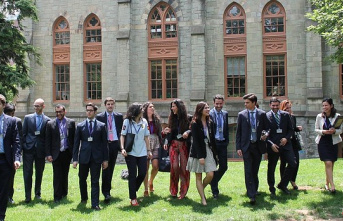The new generations of university students, the future professionals, are measured, from the beginning of their degrees to the end of their studies, to an uncertain panorama, caused by the economic crisis, the geopolitical situation, etc. A whole VUCA environment (volatility, uncertainty, complexity, ambiguity) that must be faced in order not to swell the numbers of dropouts (half, in the first year) or end up studying what is not desired.
From CRUE Spanish Universities they highlight the importance of "strengthening ties to the maximum with the different social agents and organizations that constitute the gateway to the labor market of their graduates", as well as the growth of chairs of companies and institutions that strengthen the relationship with the business world. «On the other hand (they add), the new offer of university degrees and Master's programs responds, in recent years, to a continuous process of adjustment and adaptation of the university curricular offer to respond to the new demands that society and companies are claiming The extensive growth of the offer of degrees
in the field of ICT, in the areas of digital and green transition, it testifies to this».
The technological field is undoubtedly established as one of the main routes of access to the labor market, since innovation has become a transversal objective, with capital letters, in the studies of the 21st century. In times of digital transformation, the CYD Foundation (Knowledge and Development) has just highlighted in the report "The employability of young people in Spain: How is the insertion of university graduates?", where it is confirmed that university graduates in computer science and engineering, industry and construction are the ones with the highest quality of job placement, while graduates in arts and humanities and services have access to lower quality jobs. An environment in which, every year, 200,000 students graduate, 60% women, according to the analysis data (prepared from the professional situation of university graduates in 2013-2014, five years after graduating).
As Montse Álvarez, from the institution's technical team, points out: “Students in the Spanish university system do not have enough information to choose a university career, especially on job placement. Or, despite having this information, they may have other priorities: vocation, ease of studies, personal preference...».
The specialized centers reinforce, more and more, the orientation to the student body, as in the case of the CEU San Pablo University: «To be employable is to have the appropriate knowledge (physics, mathematics, laws, programming...), but also with the values necessary (integrity, responsibility...) and with the required soft skills (empathy, leadership, critical thinking, teamwork...). The university must humbly approach companies to listen to them, learn from them and incorporate this learning into their experience».
The CEU educational group has recently launched its Employability Advisory Council to work with top-level executives from large organizations from all sectors of activity to improve their comprehensive training itineraries. Cepsa, Airbus, BBVA, Randstad, Ilunion, Vodafone, Deloitte, EFE... a new contribution from the big companies, also demonstrated in direct collaborations, as is the case, for example, with the Network of Telefonica Chairs throughout Spain, and with the of Accenture, Repsol, Iberdola, etc.
In the case of the IEB, Joaquín Danvila, head of the Training and Development Department, provides some of the 'use keys' to narrow the gap between training and employment, as in the case of the important 'networking' and the alumni network: "For more than 30 years now, we have managed to make our students perceive that an important part of our added value, in addition to quality training, is the network of contacts (with former students and, of course, with our faculty made up of prestigious professionals. We also have more than 1,300 agreements with companies that have enabled 100% of undergraduate students to work on their fourth year of double undergraduate degrees».
As Danvila points out, “it is not just the fact of being close to companies, it is often including them in the definition of content and even working together with challenges for student participation in a business environment. All our training programs have incorporated content that companies require of us when sending them candidates, and new programs have been designed and launched with what is necessary to have professional opportunities».
Within this context of opportunities, institutions such as Fundación Universidad-Empresa have initiatives such as the START program (Internships for undergraduate and postgraduate university students), with an average duration of 900 hours per academic year. A connection with labor practice that has become a hallmark of Universidad Europea, as highlighted by Sara Torre, head of the Professional Careers area and Student Experience Unit: "Our hybrid and personalized training in extensive state-of-the-art facilities, with More than 14,000 agreements with companies from different sectors, creating unique and innovative alliances such as the Real Madrid Graduate School-Universidad Europea, allow us to have an employability rate of our graduates of 90% 18 months after completing their studies».
The Professional Careers and Employability Area of the Universidad Europea has a 'job hunter' for students, with personalized guidance to enhance their professional profile, training to improve their CV and 'personal brand' on social networks, or to prepare for a selection process. "Furthermore (adds Torre), 60% of our professors combine teaching with professional work in companies."
The UNED, which celebrates its 50 years of history, highlights, for its part, its status as "one of the best universities in Spain for the results of job placement in Social and Legal Sciences, Arts and Humanities, and Sciences according to the U- Ranking 2020, prepared and published by the BBVA Foundation and the IVIE». If 85.3% of its graduates start working when they finish their degree, 92.7% get a job two years after finishing their master's degree. The result of initiatives such as its Orientation and Employment Center (COIE), dependent on the Office of the Vice President for Students and Entrepreneurship, with a network of COIEs in its numerous centers in Spain.
UTAD also has, like the rest of the institutions consulted, a faculty in which experience in the company predominates. In his case, to meet "the demand of a market that requests more and more workers with STEM profiles." Mathematics, Artificial Intelligence, Software Engineering, cybersecurity, 'extended realities'... a guarantee of employability: «Students in these areas start working even before finishing their degree, due to the high demand, and enjoy economic conditions and really good career plans.”
In the case of Comillas, they highlight its status as “a national and international reference in sustainability, transversal in the university. Not in vain, not only the chairs of the Higher Technical School of Engineering (Comillas ICAI) on energy address these issues (Hydrogen; New Energy Technologies; Connected Industry; Energy and Poverty, Energy Transition...), but it is also common in other of the Faculty of Economic and Business Sciences (Comillas ICADE), such as Social Impact, Economic and Business Ethics, Sustainable Economy...».
From this approach, the institution ascends to the general to refer to the success of its training model: «Choosing educational tradition, capacity for innovation, comprehensive and transversal training is not a risky bet. Neither is opting for international openness (more than 600 agreements with universities around the world), relationship with companies and employability, thanks to our close relationship with more than 8,000 companies from all sectors.
At the Catholic University of Murcia (UCAM) they point to their trajectory in offering quality teaching, "in addition to tutorial support, training in values in the light of Christian humanism, excellent research and support for sport from the base, which allows the student to complete their learning in an integral way, acquiring professional and personal skills to access the world of work in the best conditions». They also point out recognition in international rankings, such as the IUNE Observatory and the CYD, for the low dropout rate and the high employability of its students.
The institution makes the Technological Institute of Murcia available to its students "and we promote the entrepreneurial spirit and vocation, advising and promoting new business models." Models that, as LinkedIn highlights in one of its recent international studies, are and will be marked by "global talent trends, marked by the reinvention of business culture: by promoting work flexibility and employee well-being." According to the company: «Companies should invest in factors as important as generating professional development opportunities (59%), work flexibility (48%), well-being and mental health (42%), training to manage remote and hybrid teams (35 %) and diversity and inclusion (26%). Employers that develop their culture in these areas will be more competitive in attracting, and retaining, talent."
«In a recent act at the Wanda Metropolitano we have delivered, for the first time for all the centers of the Polytechnic University of Madrid (first Spanish university in the QS ranking of Employability), their diplomas at two, and in some cases three, last promotions of official Bachelor's and Master's degrees (more than 15,000 summoned) and we have invested more than 250 new Doctors». Alberto Garrido, vice-rector for Quality and Efficiency at UPM, highlights the importance of an event prior to arrival in the labor market (for which a web platform for contact with collaborating companies was created). «In Spain there is talk of a talent deficit of technical and technological profiles (ICT, agriculture, environmental, infrastructure, industry, health...) that we form, a situation that would change due to the improvement in working conditions and recognition».












